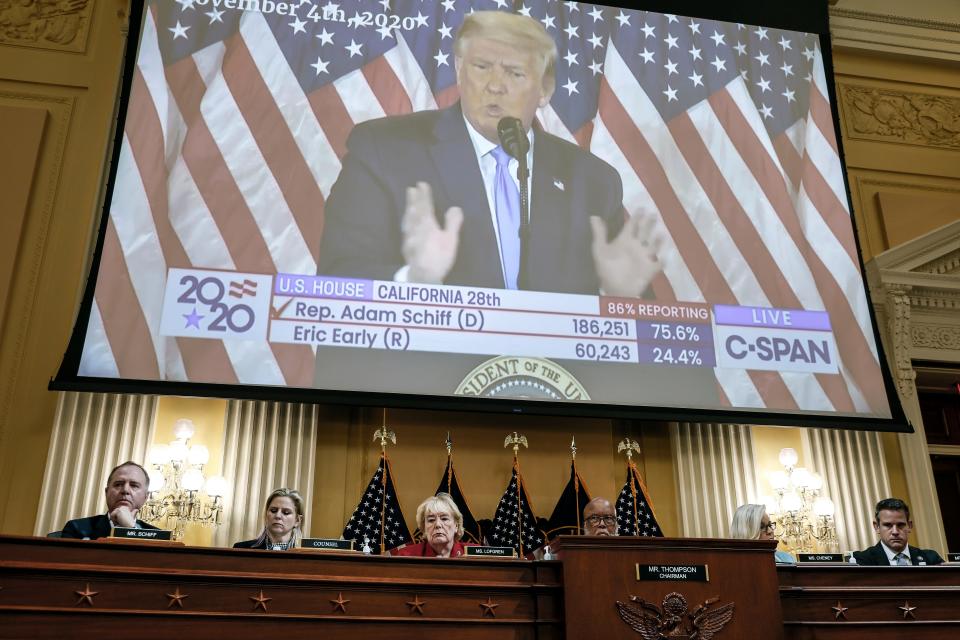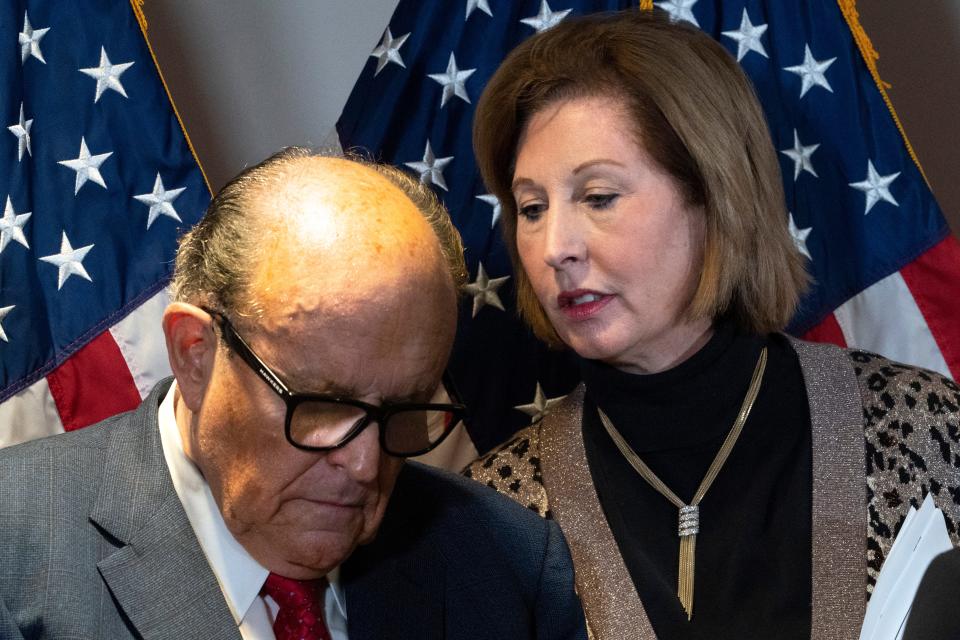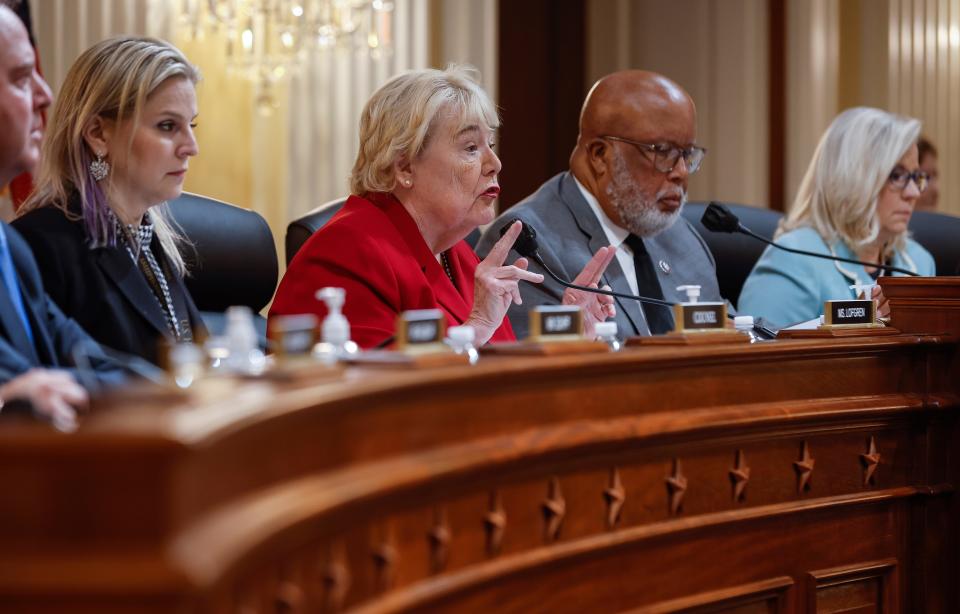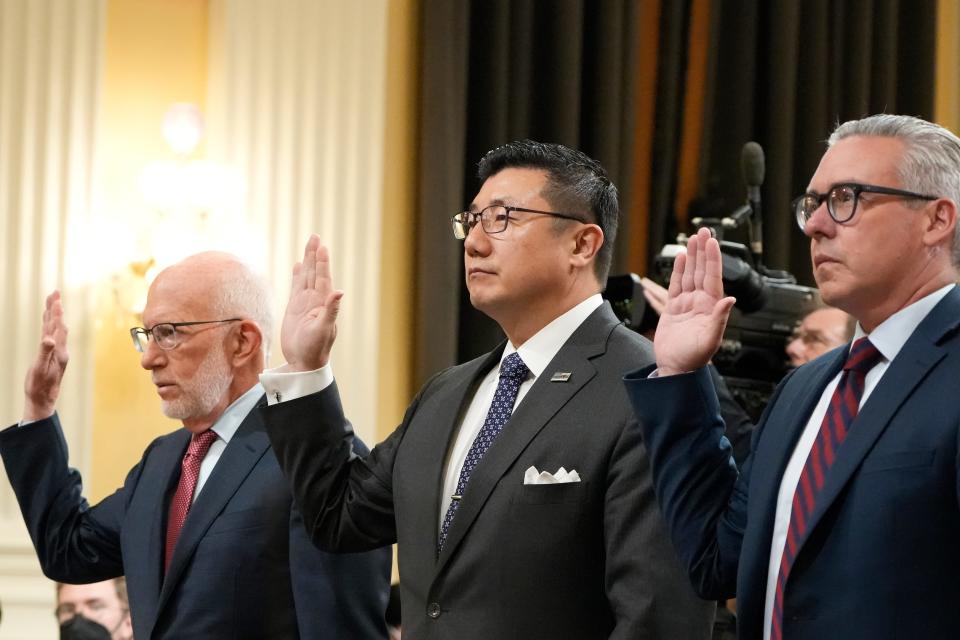Trump ignored aides and evidence he lost, panel says he ripped off donors: Jan. 6 hearing takeaways
- Oops!Something went wrong.Please try again later.
- Oops!Something went wrong.Please try again later.
- Oops!Something went wrong.Please try again later.
WASHINGTON – The House committee investigating the Jan. 6, 2021, attack on the U.S. Capitol set out to prove Monday that former President Donald Trump knew he lost the 2020 election to Joe Biden but lied to the American people with wild election fraud claims against the advice of top aides.
"He lost," said Rep. Bennie Thompson, D-Miss, the bipartisan committee's chairman, kicking off a second public hearing on the committee's findings. "But he betrayed the trust of the American people. He ignored the will of the voters. He lied to his supporters and the country, and he tried to remain in office after the people had voted him out."
The committee released a mountain of interviews with former Trump officials and campaign aides – leaning particularly on videotaped depositions from former Trump Attorney General Bill Barr and campaign manager Bill Stepien – to meticulously debunk Trump's election fraud arguments.
More: Barr told Trump his fraud claims were 'bull----.' Former AG emerges as key witness at Jan. 6 hearing
More important, the committee zeroed in on how Trump was made aware of the inaccuracies of his claims but continued pushing them to supporters anyway. The committee argued he defrauded the public by raising millions of dollars off lies.
Here are takeaways from a hearing dominated by one theme: Trump knew he didn't win the election.
Trump declared victory on election night as advisers urged him to wait
A significant portion of the committee's second hearing focused on Trump's premature declaration on election night that he won the 2020 election against Joe Biden before mail ballots were fully counted.
Stepien said he recommended that Trump use any election night speech to say votes were still being counted and it was too early to call.
“The president disagreed with that. He thought I was wrong. He told me so. He was going to go in a different direction,” Stepien said.
Instead, the committee said, Trump leaned on the advice of former New York Mayor Rudy Giuliani to claim he won. The committee characterized Giuliani as "inebriated," a claim supported by Trump adviser Jason Miller, who told the committee, "The mayor was definitely intoxicated."

Stepien recounted that Giuliani wanted to speak to Trump on election night as the president's top brass gathered at the White House to follow the returns. Giuliani told the committee he spoke to Trump "several times" that night.
"There were suggestions, I believe it was Mayor Giuliani, to go and declare victory and say that we won outright," Miller said.
More: Miss Day 2 of the Jan. 6 hearing? Bill Barr returns, election lies debunked and more
Trump knew 'before the election' that mail ballots would favor Biden
Rep. Liz Cheney, R-Wyo., the committee's vice chair, pointed to evidence that Trump "knew before the election" that mail ballots – crucial in closely contested battleground states Pennsylvania, Michigan and Wisconsin – would favor Biden.
Leading up to Election Day 2020, observers repeatedly warned of a "red mirage" that would show Trump initially leading but a "blue shift" favoring Biden as more mail ballots were counted. Biden dominated votes cast by mail after Trump spent months attacking the practice.
Trump exploited those dynamics on election night, multiple witnesses told the committee.
“That seemed to be the basis for this broad claim that there was major fraud," Barr said. "And I didn't think much of that because people had been talking for weeks and everyone understood for weeks that was going to be what happened on election night."
More: What did Americans learn in the Jan. 6 committee's hearing on the Capitol attack?
Barr said that "right out of the gate" on election night Trump started making claims of voter fraud "before there was actually any potential evidence."
Stepien told the committee that he advised Trump before the election to prepare for a "long night" and a counting process that could take several days because of mail ballots. Trump declared victory anyway.
Trump ignored advice that claims of fraud were false
Over and over, Trump's campaign team and top advisers told the president his claims of voting fraud were false and based on misinformation, but that didn't stop his pursuit to challenge results, testimony highlighted by the committee showed.
"All the early claims that I understood were completely bogus and silly and usually based on complete misinformation," Barr said in a videotaped deposition.
Among the most outlandish allegations was that an algorithm used in voting machines produced by Dominion Voting Systems took votes from Trump and gave them to Biden.
“I never saw any evidence whatsoever to sustain those allegations,” Trump attorney Eric Herschmann said in a videotaped deposition presented by the committee. Barr called the Dominion allegations “complete nonsense.”
More: Jan. 6 committee hearing schedule: Here's what we know about the upcoming Jan. 6 hearings
BJay Pak, a Trump-appointed former U.S. attorney in Georgia, said he looked into Trump and Giuliani's claims of "suitcases of ballots" found in Atlanta but quickly discovered it was "an official lockbox where ballots were kept safe."
Advisers were also clear to Trump that he, in fact, lost the election. Stepien told Trump fours days after the election that the odds of him pulling out a victory were "very, very, very bleak" based on the numbers.
Barr recounted a conversation he had with Jared Kushner, an adviser and Trump's son-in-law, and chief of staff Mark Meadows after the election in which he asked how much longer Trump would keep claiming the election was stolen.
"Look, I think that he's becoming more realistic and knows that there's a limit to how far he can take this," Meadows said, according to Barr. "We are working on this. We're working on it, " Kushner added, according to Barr's account.
'Team normal' versus Giuliani
Testimony from former Trump aides exposed a rift within Trump's orbit as the former president grew reliant on the legal advice of Giuliani, who emerged as a key player in Trump's legal team after the election, and others with fantastical claims about the election.
"I didn't mind being characterized as being a part of 'team normal,'" Stepien told the committee, but he called the camp led by Giuliani "not necessarily honest or professional."
Trump's legal team, which also included attorney Sidney Powell, pushed false ideas about voting machines by Dominion Voting Systems being rigged for Biden, suitcases of ballots being found in Georgia and a truck bringing in 100,000 ballots in garbage cans. The committee played videos of some of Giuliani and Powell's wildest theories that have been disproven.
"I thought, 'Boy, if he really believes these things, he's become detached from reality,'" Barr said of Trump's claims about Dominion voting machines, adding that before the election it was possible to "talk sense" to the president even if it required a "big wrestling match."
"After the election, he didn't seem to be listening," Barr said.

Kushner told Trump that following Giuliani's path was "not the approach I would take if I was you."
Alex Cannon, a Trump campaign lawyer, discussed an exchange he had with Trump adviser Peter Navarro in which Cannon brought up a report from Chris Krebs, director of the Cybersecurity and Infrastructure Security Agency, that found the election was secure.
"Mr. Navarro accused me of being an agent of the deep state working with Chris Krebs against the president," Cannon said. "And I never took another phone call from Mr. Navarro."
Trump raised millions on election lies, defrauding donors, committee argues
Committee members argued that Trump, despite knowing his claims about the election were false, raised $250 million from campaign donors including $100 million in the first week after the election to continue fighting the results.
In doing so, committee members laid out a potential legal case for fraud claims against Trump.
Rep. Zoe Lofgren, D-Calif., said the Trump campaign “misled” campaign donors that their money would be used for election fraud claims. But instead of supporting litigation, she said funds went to a Trump-backed political action committee called Save America PAC.
According to the committee, the PAC gave $1 million to Meadows' charitable organization, $1 million to the America First Policy Institute, which employs several former Trump officials, and more than $200,000 to the "Trump Hotel collection," among other causes unrelated to Trump's legal fight.
"So not only was there the big lie, there was the big rip-off," Logren said. “Donors deserve to know where their funds are really going. They deserve better than what President Trump and his team did."
The committee pointed to fundraising emails, sometimes numbering 25 a day, warning the "left-wing mob was undermining the election" and imploring supporters to "step up to protect the integrity of the election."
More: Meet the members of the January 6 House select committee ahead of first public hearing Thursday

But the committee's investigators said there was no evidence that an "Election Defense Fund," an entity that Trump raised money under after the election, actually existed.
"I don't believe there is actually a fund called the Election Defense Fund," Hanna Allred, a former Trump campaign staff member, told the committee. She called it a "marketing tactic."
Lofgren said Trump's opportunity to challenge election results in court passed with the
"safe harbor" deadline on Dec. 14, 2020. The fact that his litigation continued anyway, she said, "makes more sense" when considering it was a way to raise money.
Meanwhile, Trump was losing his arguments in court. Ben Ginsberg, a prominent Republican election attorney, told the committee that Trump lost each of his 61 lawsuits challenging election results and that none validated his claims.
"The Trump campaign had a couple of basic problems. No. 1, the 2020 election was not close," Ginsberg said. “The simple fact is that the Trump campaign did not make its case."

Reach Joey Garrison on Twitter @joeygarrison.
This article originally appeared on USA TODAY: Jan 6 hearings: Trump ignored evidence on 2020 election fraud claims

